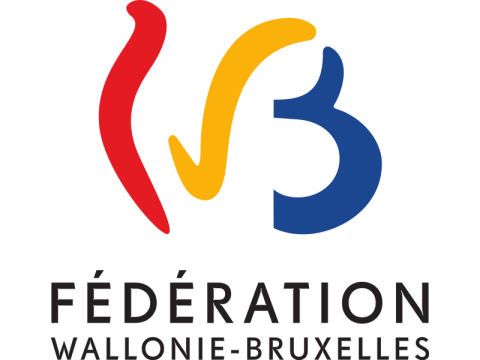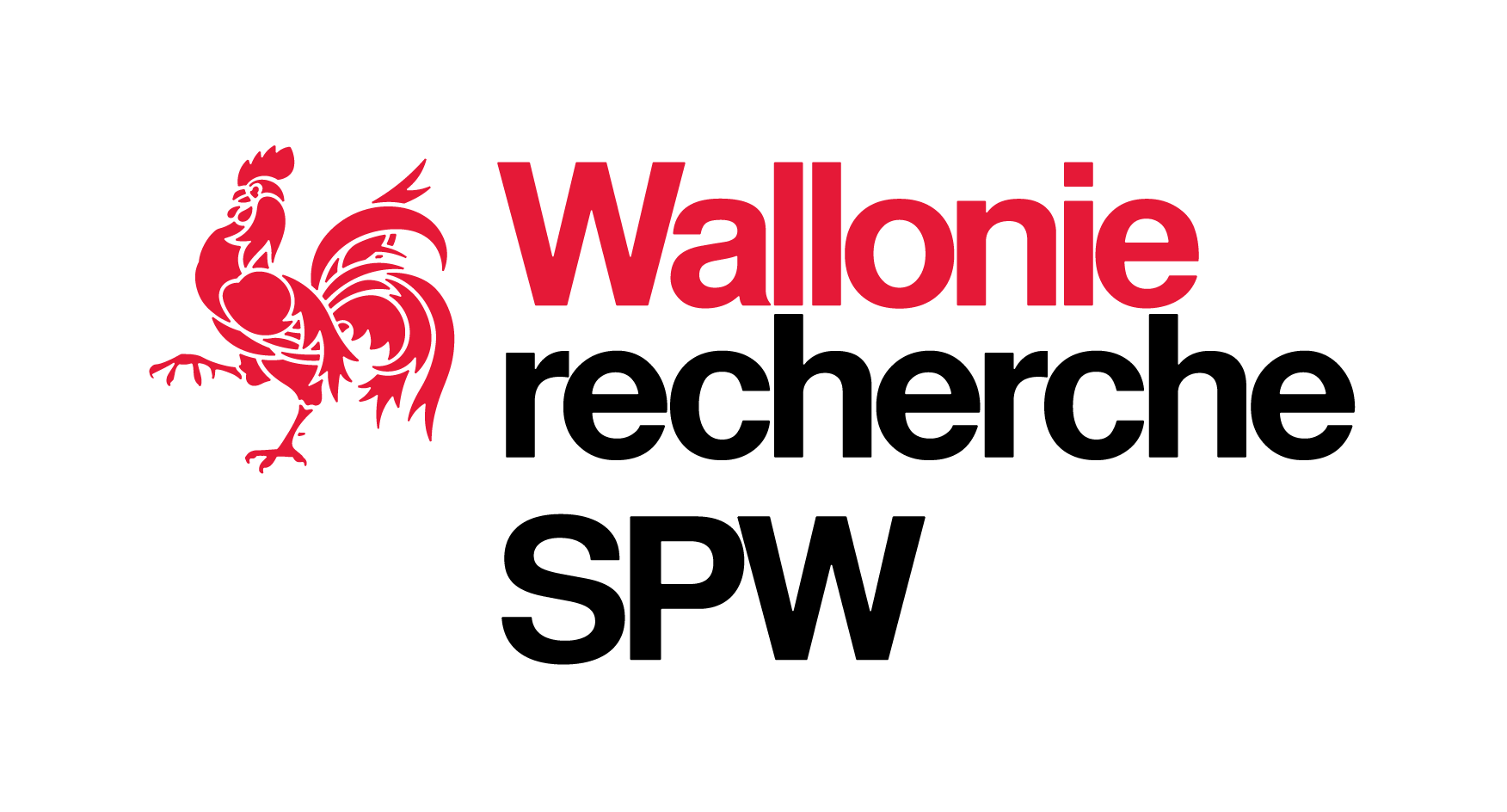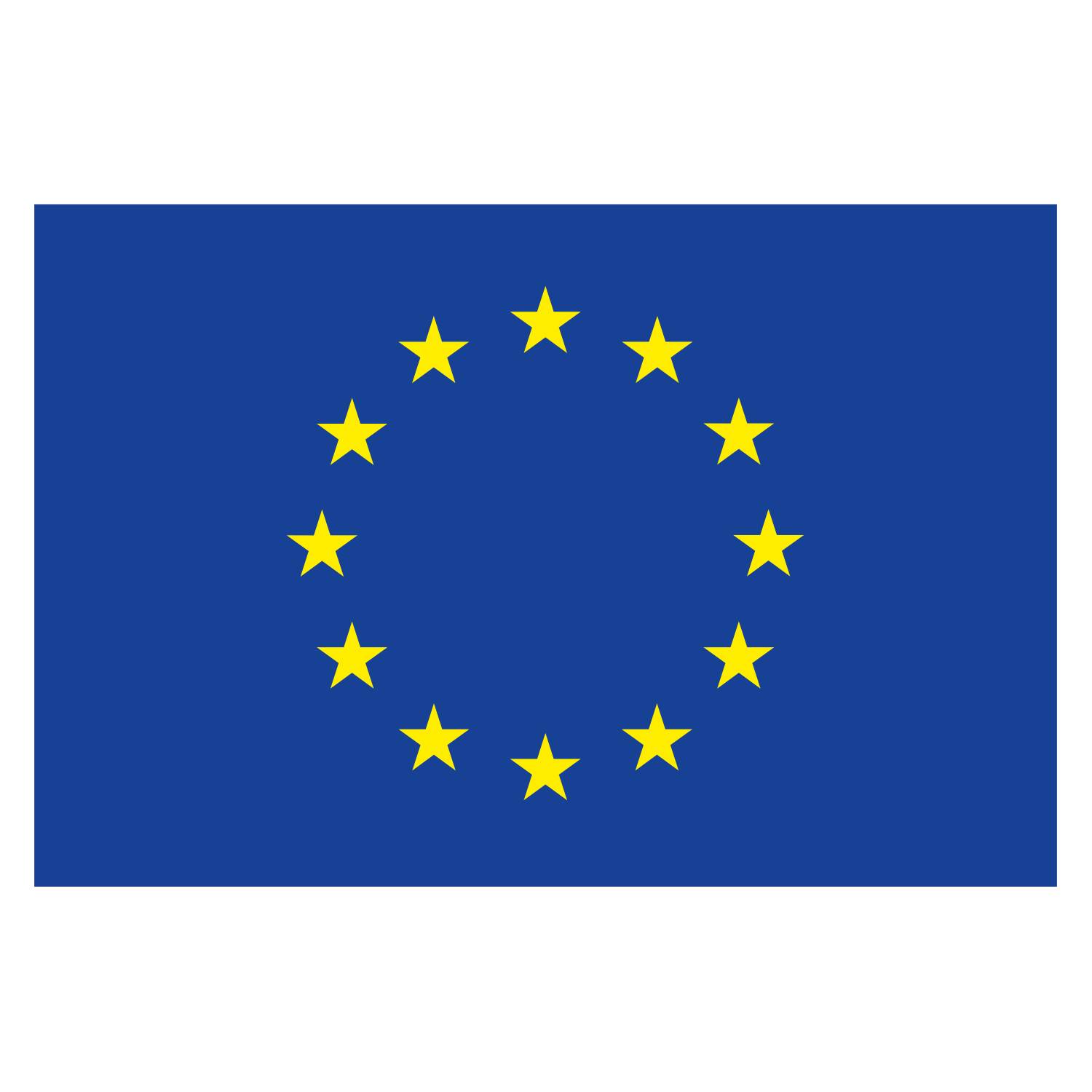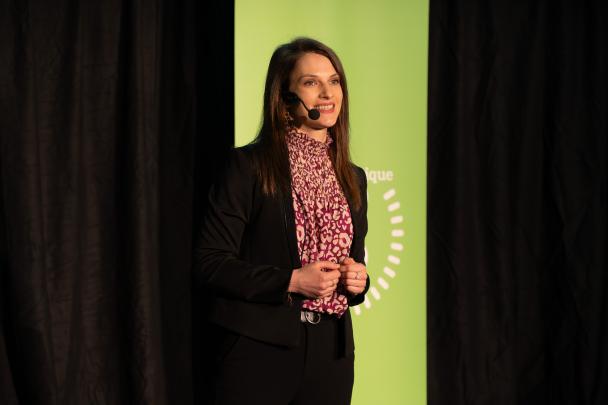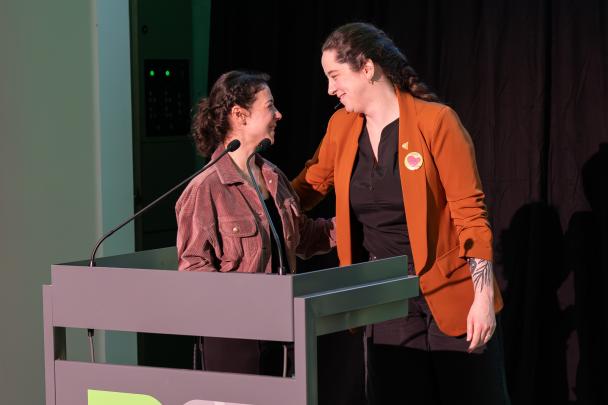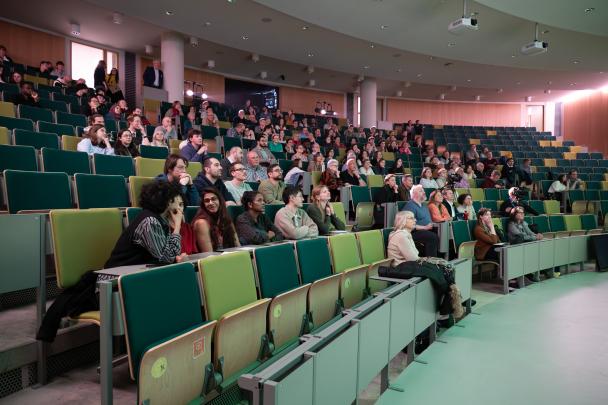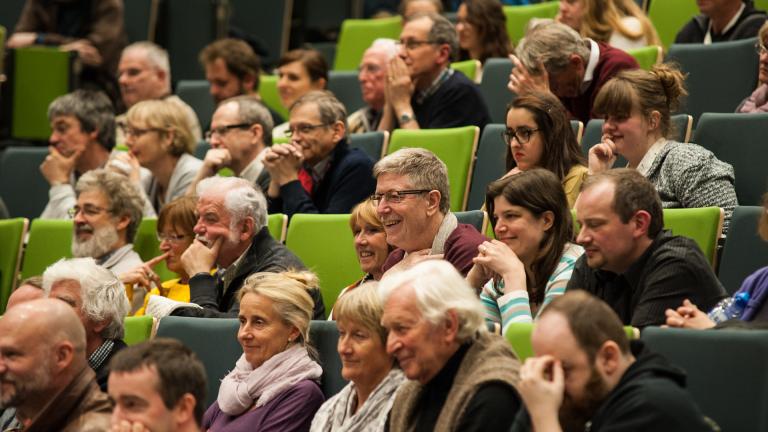Welcome to Confluent des Savoirs (CDS), the University of Namur's research awareness, outreach, and dissemination service. Through its activities and events, the multidisciplinary and dynamic team builds bridges between researchers from the university's seven faculties, research, and citizens!
Spotlight
News
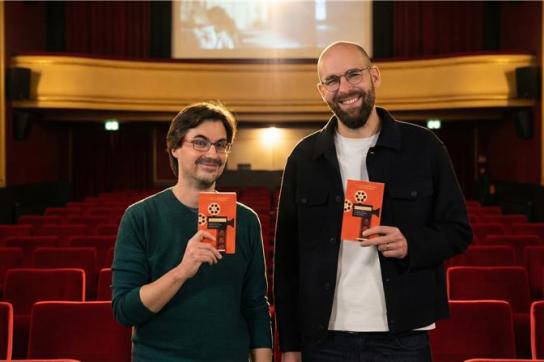
Twenty films to understand digital technology: a fun challenge taken up by two experts from UNamur
Twenty films to understand digital technology: a fun challenge taken up by two experts from UNamur
Terminator to talk about AI? Wall-E to talk about technological dependence? The Truman Show to discuss social media? In a new book, two professors from UNamur, Anthony Simonofski (digital transformation—EMCP Faculty—NaDI Institute) and Benoît Vanderose (software engineering—Faculty of Computer Science—NaDI Institute), take readers on a journey at the crossroads of digital technology and cinematic imagination.
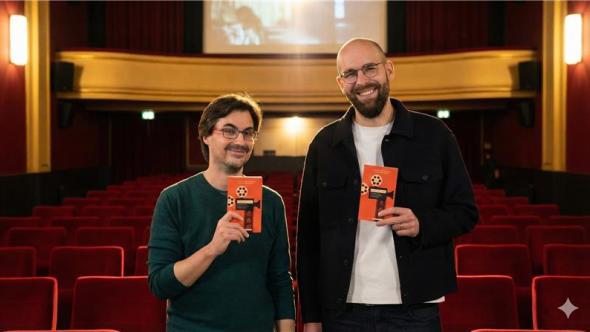
Their book "Cinématech - Twenty Works to Understand Digital Technology" is primarily educational in nature, as it allows readers to better understand digital technology and its challenges. But the originality of the approach chosen by the two authors makes it both entertaining and informative.
"The idea is simple: use 20 films and series to illustrate the history of digital technology, three important technologies (AI, robotics, XR) and their challenges. To do this, we start with Terminator, Her, Wall-E, Minority Report, and many others to make these subjects accessible," explains Anthony Simonofski, Professor in the Faculty of Economics, Management, Political Science, and Communication (EMCP).
Published by the Royal Academy of Sciences, Letters, and Fine Arts of Belgium, the book is an extension of the Pop-Code podcast produced by the two experts and film buffs. In it, they explore the use of pop culture to educate people about digital technology, while examining its challenges and limitations.
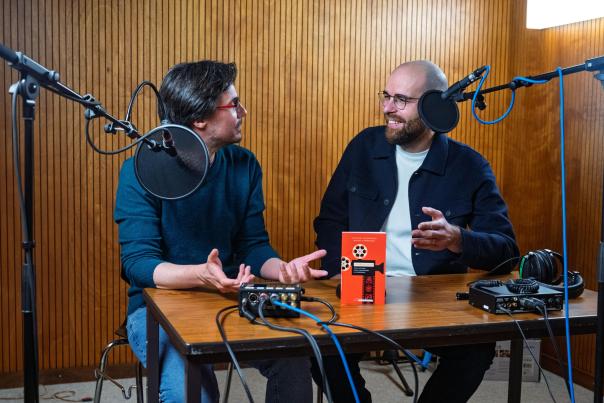
"With the book, we can expand on the podcast's content, providing greater consistency and scientific references," explains Benoit Vanderose, professor in the Faculty of Computer Science.
This new book is aimed at three audiences:
- Those who want to better understand digital technology without jargon
- Film buffs curious to see their favorite works from a different angle
- Teachers and trainers looking for concrete materials to discuss digital technology in the classroom
Digital sessions at UNamur and a research project
In addition to the Pop-Code podcast and the book Cinématech, Benoit Vanderose and Anthony Simonofski's project also takes the form of "digital sessions" organized at UNamur. What's on the program? Films followed by discussions with experts to understand the challenges of digital technology and stimulate collective reflection. In this project, Anthony Simonofski and Benoit Vanderose are joined by Anne-Sophie Collard and Fanny Barnabé. Next event? February 12 for a screening of I, Daniel Blake (Ken Loach) to talk about digital inclusion!
Also worth noting on the same theme: the ongoing research project - https://arc-projects.unamur.be/di-fic
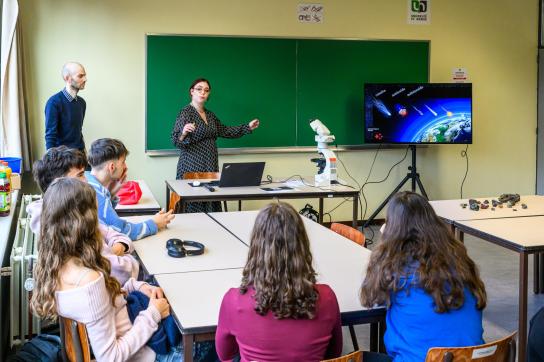
Stellar travel: a look back at Space Week UNamur 2025
Stellar travel: a look back at Space Week UNamur 2025
From October 4 to 10, UNamur embarked young and old alike on a week of fun and educational activities dedicated to the discovery of space.
The objective? To inspire, question and amaze.

Organized by the Confluent des Savoirs as part of International Space Week and the UNIVERSEH Alliance, the 2025 edition brought together nearly 800 participants of all ages, including 350 primary and secondary school students.
Highlights of the week
Throughout the week, young and old were invited to dive into the world of space research through workshops, observations and immersive experiments.
A day for secondary school students
A real highlight of the week, on Thursday October 9 the University was transformed into a veritable space laboratory to welcome 5ᵉ and 6ᵉ secondary school students to an interdisciplinary theme day. Over the course of the day, pupils were able to meet researchers, teachers, students and space professionals in workshops, encounters and challenges, exploring in turn:
- the mysteries of meteorites and space exploration with researchers from UNamur;
- the links between artificial intelligence and space, in collaboration with the Euro Space Center ;
- the biodiversity of mosses with the discovery of "resistant" micro-organisms capable of surviving in space conditions ;
- before concluding the day with an interactive and convivial quiz hosted by the "Kàp to UNIVERSEH" project Kot.
This day made a lasting impression with its participative, interdisciplinary approach, hailed by teachers and students alike.
The latter were able to handle scientific equipment, exchange views with researchers, and discover in concrete terms the diversity of space-related professions and issues.
At the same time, visits to the Antoine Thomas Astronomical Observatory and a mobile planetarium on loan from the MUMONS enabled younger pupils (primary and secondary) to explore the starry sky and ponder the mysteries of the cosmos in a fun and accessible way.

Moments of discovery for all
For several days, the Observatory exceptionally opened its doors to allow the curious to explore its dome, its workings and its instruments, including a solar telescope, the only one of its kind in Wallonia.
Accompanied by an astronomy popularizer and comfortably seated under the planetarium dome, visitors embarked on a cosmic journey, between constellations, galaxies and celestial phenomena.
These experiences, both scientific and sensory, offered a moment of shared wonder and helped strengthen links between research and the general public.
A "Space Exploration" comic book competition.
In this comic strip format drawing competition, UNamur invites you to embark on an extraordinary adventure on the theme of space exploration. The competition invites you to imagine daring missions, spectacular discoveries or distant civilizations, and to tell the story in drawings and bubbles. The Universe is waiting for you, and it's up to each and every one of us to bring it to life!

Another successful Space Week
Space Week UNamur 2025 was once again a great success. It succeeded in bringing together the general public and school audiences, mixing science, technology, creation and imagination, and anchoring the University of Namur as a dynamic player in space research and scientific mediation on space-related themes.
Beyond the fascination for astronomy, this week reminds us that space is a shared horizon, between research, innovation, citizenship and culture.
Through the Confluent des Savoirs, the University of Namur confirms its role as a bridge between academic knowledge and the public, while inspiring the new generation of explorers... terrestrial or stellar.
Le Confluent des Savoirs: research outreach and dissemination service at the University of Namur
The Belgian Space Week activities were organized and coordinated by the Confluent des Savoirs (CDS). The CDS shares knowledge and know-how from the university's seven faculties through popularization activities aimed at schools and the general public.

UNIVERSEH: new opportunities in the space sector
UNamur is a member of the European alliance European Space University for Earth and Humanity (UNIVERSEH), which focuses on the theme of space. A real recognition of UNamur's expertise in the field of space, and a gateway to new international collaborations in both teaching and research, around a field driving employment and socio-economic development.

Photos by Christophe Danaux
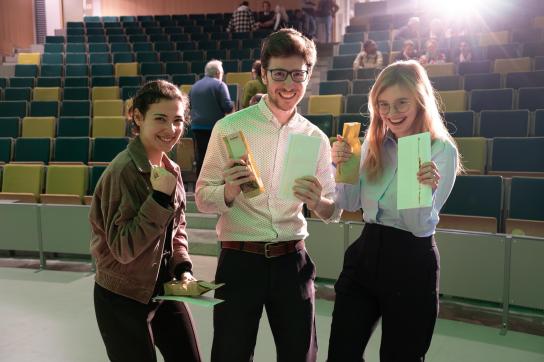
Two UNamur researchers win prizes in Ma thèse en 180 secondes competition
Two UNamur researchers win prizes in Ma thèse en 180 secondes competition
Beautiful victory for Margaux Mignolet, a researcher at the Faculty of Medicine's Unité de Recherche en Physiologie Moléculaire (URPhyM), who wins 1st prize in the Belgian inter-university final of the Ma thèse en 180 secondes (MT180) competition. Her research? To better understand the mechanisms of antibodies active in cases of long COVID. The second prize in this national competition was also won by a candidate from Namur. It was Petra Manja, from the Unité de Recherche en biologie des micro-organismes (URBM), Department of Biology, Faculty of Science, and is pursuing a thesis aimed at understanding resistance mechanisms in the bacterium E. coli. Both are also researchers at the NARILIS Institute.
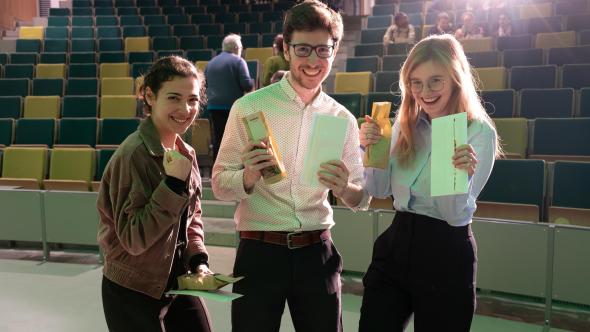
First prize for Margaux Mignolet and her research on COVID long
"The world of Dory the antibody" is the popularized title of Margaux Mignolet's thesis. This neuroscience researcher is part of the Unité de Recherche en Physiologie Moléculaire (URPhyM) at the Faculty of Medicine. She works under the supervision of Professor Charles Nicaise and is also a member of the NARILIS Institute. She studies pathogenic autoantibodies in patients with post-acute neurological sequelae of COVID-19.
"Many people still suffer from persistent symptoms after COVID (e.g. memory disorders, fatigue, pain,...). This condition is called long COVID. The mechanism is still unknown. One hypothesis is that patients have antibodies that attack their nervous system, inducing an autoimmune disease. The aim of my thesis is to determine whether patients have these antibodies. This will enable better patient care", explains Margaux Mignolet.
On Wednesday May 21, 2025, she brilliantly succeeded in popularizing her research topic and captivating the audience using clear, simple language, at the national inter-university final of the MT 180 competition. The aim of the competition is to inform the general public about the richness and interest of scientific research, while developing the communication skills of doctoral students. Each participant (doctoral student or doctor who graduated in the previous academic year) presents a clear, concise and convincing three-minute popular presentation in French on his or her thesis. All with the support of a single slide!
And Margaux Mignolet managed to convince the jury, as she won first prize in the competition!
A fine accolade for this enthusiast of the human body and medicine. "I've always been fascinated by how our bodies work, and I've always wanted to understand how diseases work and how to cure them. So I studied biomedical sciences in Namur to be able to work in research," she confides. "I never expected to win this prize! The fourteen other participants presented topics that were each more exciting than the last, and the pitches were really well written. I'm very happy to have won this prize, with Petra by my side, and to have been able to experience this competition alongside Thomas and Petra."
Second prize for Petra Manja and her research in microbiology
Doctoral students from UNamur shone particularly brightly in this competition, with second prize going to Petra Manja, a microbiology researcher at the Research Unit in Microorganism Biology (URBM) of the Faculty of Science (NARILIS Institute). She is a member of Prof. Régis Hallez's research group. Her thesis aims to understand the persistence mechanisms of the E. coli uropathogenic bacterium.
"Uropathogenic E. coli is one of the bacteria that causes cystitis. Treatment of cystitis is difficult, not least because of its persistence. When the bacteria are treated with antibiotics, the majority of the population dies, except for a small population that goes dormant and thus avoids treatment. Studies have shown that a molecule called alarmone plays a role in this form of persistence. The aim of my research is to find out more about this role. To understand it, I'm interested in the protein that produces alarmone, called SpoT. The idea is to find a regulator of SpoT that will be activated when bacteria are treated with antibiotics. This regulator will in turn activate SpoT which leads to alarmone production and bacterial dormancy," she explains. "I really enjoyed this experience, I learned how to popularize my work to make it accessible to the general public. It's also for them that we do science", she reacts.
Her presentation was entitled: "Dormir pour ne pas mourir".
A fine performance for Thomas Rouma and his research on immune responses
Thomas Rouma, also a researcher at URBM (Faculty of Science) and the NARILIS Institute, and whose doctoral thesis is co-directed by Professors Eric Muraille and Xavier De Bolle, is studying the protective immune response against lung infections caused by Acinetobacter baumannii in mice.
His presentation was entitled: "How to get rid of a freeloader!"
Congratulations to Margaux, Petra and Thomas, who rose to the challenge of presenting their thesis in 180 seconds!
15 PhD students, 180 seconds to convince
Each year, the MT180 competition takes place initially in the five universities of the Wallonia-Brussels Federation: UCLouvain, ULB, ULiège, UMONS and UNamur. Each university nominates candidates to take part in the inter-university final. This year, the inter-university final brought together 15 doctoral students, including the 3 candidates from UNamur: Margaux Mignolet, Petra Manja and Thomas Rouma.
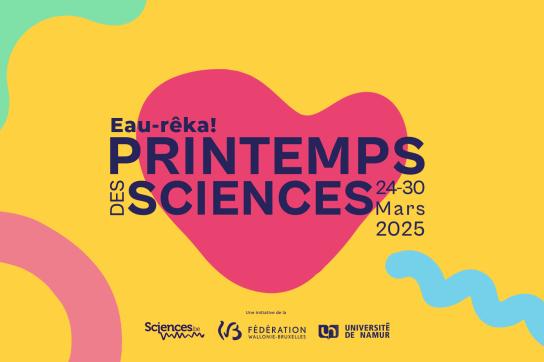
A look back at Printemps des Sciences 2025: science and technology take center stage for a week at UNamur
A look back at Printemps des Sciences 2025: science and technology take center stage for a week at UNamur
The 24th edition of Printemps des Sciences was held from March 24 to 30 throughout Wallonia and Brussels, on the theme of "Eau-rêka". The aim of this annual event is to make science and technology accessible to as many people as possible. Mission accomplished for this new edition!
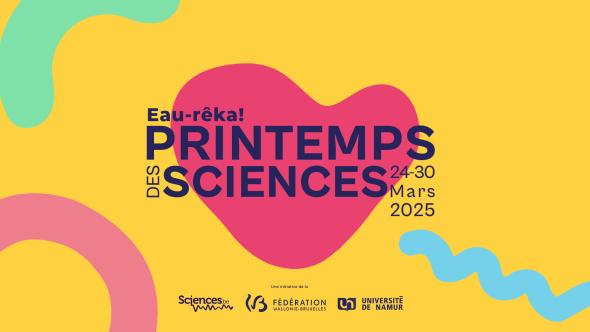
Le Printemps des Sciences is coordinated in the Province of Namur by the Confluent des Savoirs, the outreach, popularization and research dissemination service of the University of Namur. This year, the Confluent des Savoirs team has also taken the lead in the national coordination of the 2025 edition of Printemps des Sciences.
At UNamur, the university community (researchers, PhD students, laboratory technicians, students, etc.) once again mobilized extensively to arouse the curiosity of pupils and the general public in science and technology. Their commitment made it possible to discover the wealth of scientific studies and professions through a wide range of activities.
An inaugural conference to reflect on water protection
The Printemps des Sciences kicked off on March 19 at UNamur, with an inaugural conference on the theme of "Water, a common good to be preserved". This was an opportunity to bring together experts from all fields (environment, hydrology and philosophy) to discuss the challenges facing this essential resource: pollution, collective management, disruption of the water cycle, land use planning, etc. A fascinating debate that highlighted the importance of building a society that is more respectful of its common resources.
Relive the evening in replay
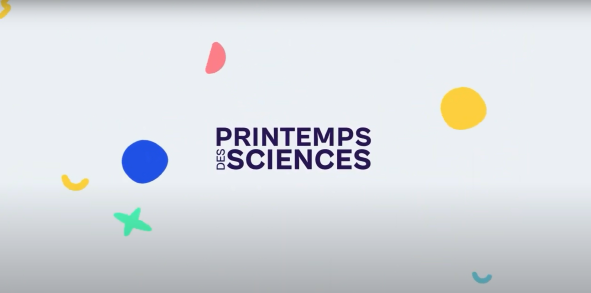
School activities to explore and marvel at
Over 5 days, more than 2,000 primary and secondary school students roamed the corridors of the university to take part in the 40 or so activities proposed by the various departments and laboratories. The latter vied with each other in creativity to offer interactive and fun activities, enabling young people to see science in a different way, outside the classroom.
Highlights included a plunge into the heart of nuclear physics, the exploration of fascinating organisms under the microscope, events combining sporting and mathematical challenges, and an unusual encounter with hens in an aviary set up in the science courtyard.
An event open to all
While numerous activities are on offer for schools, the general public has not been forgotten either. A number of activities have been organized for young and old who are curious about science. These included a "Chill & Sciences" scientific café on the theme of global warming as seen through the prism of Arctic thawing, a workshop on electronics and a visit to the Antoine Thomas Astronomical Observatory. The Printemps des Sciences event coincided with the observation of a partial eclipse of the Sun on the morning of Saturday March 29. A rare spectacle that left the public in awe!
The Printemps des Sciences is also an opportunity to offer the public other activities to raise awareness and disseminate science in line with the event's objectives:
- The Mapathon: A humanitarian mapping rendezvous
In a few hours and in a convivial atmosphere, UNamur's Geography Department introduced the volunteers present to contribute to a little-known dimension of humanitarian aid: the mapping of vulnerable areas. The maps produced open up new access routes for humanitarian aid, for Médecins Sans Frontières and the Red Cross in particular.
- Ma Thèse en 180 secondes : Un concours de vulgarisation pour les doctorants
In 3 minutes and not one more, PhD students present their thesis topic popularized with clarity and efficiency to captivate the audience. In 2025, 10 PhD students took part in the competition and three winners were selected to represent UNamur at the inter-university final to be held in May at UMons.
Break down preconceived ideas and encourage people to take up a scientific career
If science and technology intrigue, they sometimes suffer from deep-seated stereotypes. Austere, disconnected, reserved for an elite? So many preconceived ideas that Printemps des Sciences is helping to deconstruct by opening the doors of laboratories and research institutes.
Jérôme Daquin, Professor in the Department of Mathematics: "An event like Printemps des Sciences helps to show that mathematics is concrete, that it can be applied in everyday life and, above all, that it can be done in a fun way. It's not something austere and disconnected from reality, quite the opposite."
Boris Hespeels, researcher in the Department of Biology: "Often we see the scientist in his ivory tower, hyper serious. And what makes us here is that we're having fun. And we're also having fun sharing it. We want to show that doing research, doing science, is a really cool thing to do."
The researchers we interviewed are unanimous: without underestimating the challenges encountered on a daily basis, the science streams promise potential for fulfillment for each and every one.
Régis Falque, Assistant and doctoral student in EMCP (Faculty Economics Management Communication Politics): "The scientific profession offers opportunities for discovery that are second to none. [...] It's a wonderful adventure. It's not easy, it takes time and investment, but it's a wonderful adventure."
Boris Hespeels, researcher in the Department of Biology: "[Science] is not something you do alone. [...] I think that's also the message, we need everyone, we need all profiles."
To young people who might still be hesitant about taking the plunge:"The advice is just, go for it, go for it. There's no risk in going into science. It's a buoyant field at the moment, we're heading that way." sums up Tamara Puttemans, a laboratory technician in the Biology Department.
Scientific and cultural partners
The Printemps des Sciences is a unifying event that also brings together numerous scientific and socio-cultural partners from Namur outside the university.
Computer Museum NAM-IP, Musée des arts anciens - TreM.a and the Société archéologique de Namur, Espace muséal d'Andenne, NID Namur - Ville de Namur, Le Delta, KIKK asbl, Le Pavillon, Empreintes asbl, ARC Namur, CIDJ, Culture In Vivo, Balteau, Inasep, Jan De Nul, Union royale belge des amateurs-émetteurs (UBA), Ose la Science, La Leçon Verte, Vent Sauvage, Repair Together, UTAN, Iles de Paix, Nature&sens, Eurospace Society, Cercle Astronomique Mosan, Mars Society Belgium.
The 2025 edition in figures
- 3,529 pupils enrolled
- 40 activities at UNamur alone
- Nearly 1,000 curious visitors
- 20 partners
- 4 partner higher education establishments in the Province of Namur
- An average of 10 km per day covered by the team members!
Le Printemps des Sciences est une initiative de la Fédération Wallonie-Bruxelles, coordonnée par le réseau Sciences.be, organisée par les universités et les hautes écoles.

Twenty films to understand digital technology: a fun challenge taken up by two experts from UNamur
Twenty films to understand digital technology: a fun challenge taken up by two experts from UNamur
Terminator to talk about AI? Wall-E to talk about technological dependence? The Truman Show to discuss social media? In a new book, two professors from UNamur, Anthony Simonofski (digital transformation—EMCP Faculty—NaDI Institute) and Benoît Vanderose (software engineering—Faculty of Computer Science—NaDI Institute), take readers on a journey at the crossroads of digital technology and cinematic imagination.

Their book "Cinématech - Twenty Works to Understand Digital Technology" is primarily educational in nature, as it allows readers to better understand digital technology and its challenges. But the originality of the approach chosen by the two authors makes it both entertaining and informative.
"The idea is simple: use 20 films and series to illustrate the history of digital technology, three important technologies (AI, robotics, XR) and their challenges. To do this, we start with Terminator, Her, Wall-E, Minority Report, and many others to make these subjects accessible," explains Anthony Simonofski, Professor in the Faculty of Economics, Management, Political Science, and Communication (EMCP).
Published by the Royal Academy of Sciences, Letters, and Fine Arts of Belgium, the book is an extension of the Pop-Code podcast produced by the two experts and film buffs. In it, they explore the use of pop culture to educate people about digital technology, while examining its challenges and limitations.

"With the book, we can expand on the podcast's content, providing greater consistency and scientific references," explains Benoit Vanderose, professor in the Faculty of Computer Science.
This new book is aimed at three audiences:
- Those who want to better understand digital technology without jargon
- Film buffs curious to see their favorite works from a different angle
- Teachers and trainers looking for concrete materials to discuss digital technology in the classroom
Digital sessions at UNamur and a research project
In addition to the Pop-Code podcast and the book Cinématech, Benoit Vanderose and Anthony Simonofski's project also takes the form of "digital sessions" organized at UNamur. What's on the program? Films followed by discussions with experts to understand the challenges of digital technology and stimulate collective reflection. In this project, Anthony Simonofski and Benoit Vanderose are joined by Anne-Sophie Collard and Fanny Barnabé. Next event? February 12 for a screening of I, Daniel Blake (Ken Loach) to talk about digital inclusion!
Also worth noting on the same theme: the ongoing research project - https://arc-projects.unamur.be/di-fic

Stellar travel: a look back at Space Week UNamur 2025
Stellar travel: a look back at Space Week UNamur 2025
From October 4 to 10, UNamur embarked young and old alike on a week of fun and educational activities dedicated to the discovery of space.
The objective? To inspire, question and amaze.

Organized by the Confluent des Savoirs as part of International Space Week and the UNIVERSEH Alliance, the 2025 edition brought together nearly 800 participants of all ages, including 350 primary and secondary school students.
Highlights of the week
Throughout the week, young and old were invited to dive into the world of space research through workshops, observations and immersive experiments.
A day for secondary school students
A real highlight of the week, on Thursday October 9 the University was transformed into a veritable space laboratory to welcome 5ᵉ and 6ᵉ secondary school students to an interdisciplinary theme day. Over the course of the day, pupils were able to meet researchers, teachers, students and space professionals in workshops, encounters and challenges, exploring in turn:
- the mysteries of meteorites and space exploration with researchers from UNamur;
- the links between artificial intelligence and space, in collaboration with the Euro Space Center ;
- the biodiversity of mosses with the discovery of "resistant" micro-organisms capable of surviving in space conditions ;
- before concluding the day with an interactive and convivial quiz hosted by the "Kàp to UNIVERSEH" project Kot.
This day made a lasting impression with its participative, interdisciplinary approach, hailed by teachers and students alike.
The latter were able to handle scientific equipment, exchange views with researchers, and discover in concrete terms the diversity of space-related professions and issues.
At the same time, visits to the Antoine Thomas Astronomical Observatory and a mobile planetarium on loan from the MUMONS enabled younger pupils (primary and secondary) to explore the starry sky and ponder the mysteries of the cosmos in a fun and accessible way.

Moments of discovery for all
For several days, the Observatory exceptionally opened its doors to allow the curious to explore its dome, its workings and its instruments, including a solar telescope, the only one of its kind in Wallonia.
Accompanied by an astronomy popularizer and comfortably seated under the planetarium dome, visitors embarked on a cosmic journey, between constellations, galaxies and celestial phenomena.
These experiences, both scientific and sensory, offered a moment of shared wonder and helped strengthen links between research and the general public.
A "Space Exploration" comic book competition.
In this comic strip format drawing competition, UNamur invites you to embark on an extraordinary adventure on the theme of space exploration. The competition invites you to imagine daring missions, spectacular discoveries or distant civilizations, and to tell the story in drawings and bubbles. The Universe is waiting for you, and it's up to each and every one of us to bring it to life!

Another successful Space Week
Space Week UNamur 2025 was once again a great success. It succeeded in bringing together the general public and school audiences, mixing science, technology, creation and imagination, and anchoring the University of Namur as a dynamic player in space research and scientific mediation on space-related themes.
Beyond the fascination for astronomy, this week reminds us that space is a shared horizon, between research, innovation, citizenship and culture.
Through the Confluent des Savoirs, the University of Namur confirms its role as a bridge between academic knowledge and the public, while inspiring the new generation of explorers... terrestrial or stellar.
Le Confluent des Savoirs: research outreach and dissemination service at the University of Namur
The Belgian Space Week activities were organized and coordinated by the Confluent des Savoirs (CDS). The CDS shares knowledge and know-how from the university's seven faculties through popularization activities aimed at schools and the general public.

UNIVERSEH: new opportunities in the space sector
UNamur is a member of the European alliance European Space University for Earth and Humanity (UNIVERSEH), which focuses on the theme of space. A real recognition of UNamur's expertise in the field of space, and a gateway to new international collaborations in both teaching and research, around a field driving employment and socio-economic development.

Photos by Christophe Danaux

Two UNamur researchers win prizes in Ma thèse en 180 secondes competition
Two UNamur researchers win prizes in Ma thèse en 180 secondes competition
Beautiful victory for Margaux Mignolet, a researcher at the Faculty of Medicine's Unité de Recherche en Physiologie Moléculaire (URPhyM), who wins 1st prize in the Belgian inter-university final of the Ma thèse en 180 secondes (MT180) competition. Her research? To better understand the mechanisms of antibodies active in cases of long COVID. The second prize in this national competition was also won by a candidate from Namur. It was Petra Manja, from the Unité de Recherche en biologie des micro-organismes (URBM), Department of Biology, Faculty of Science, and is pursuing a thesis aimed at understanding resistance mechanisms in the bacterium E. coli. Both are also researchers at the NARILIS Institute.

First prize for Margaux Mignolet and her research on COVID long
"The world of Dory the antibody" is the popularized title of Margaux Mignolet's thesis. This neuroscience researcher is part of the Unité de Recherche en Physiologie Moléculaire (URPhyM) at the Faculty of Medicine. She works under the supervision of Professor Charles Nicaise and is also a member of the NARILIS Institute. She studies pathogenic autoantibodies in patients with post-acute neurological sequelae of COVID-19.
"Many people still suffer from persistent symptoms after COVID (e.g. memory disorders, fatigue, pain,...). This condition is called long COVID. The mechanism is still unknown. One hypothesis is that patients have antibodies that attack their nervous system, inducing an autoimmune disease. The aim of my thesis is to determine whether patients have these antibodies. This will enable better patient care", explains Margaux Mignolet.
On Wednesday May 21, 2025, she brilliantly succeeded in popularizing her research topic and captivating the audience using clear, simple language, at the national inter-university final of the MT 180 competition. The aim of the competition is to inform the general public about the richness and interest of scientific research, while developing the communication skills of doctoral students. Each participant (doctoral student or doctor who graduated in the previous academic year) presents a clear, concise and convincing three-minute popular presentation in French on his or her thesis. All with the support of a single slide!
And Margaux Mignolet managed to convince the jury, as she won first prize in the competition!
A fine accolade for this enthusiast of the human body and medicine. "I've always been fascinated by how our bodies work, and I've always wanted to understand how diseases work and how to cure them. So I studied biomedical sciences in Namur to be able to work in research," she confides. "I never expected to win this prize! The fourteen other participants presented topics that were each more exciting than the last, and the pitches were really well written. I'm very happy to have won this prize, with Petra by my side, and to have been able to experience this competition alongside Thomas and Petra."
Second prize for Petra Manja and her research in microbiology
Doctoral students from UNamur shone particularly brightly in this competition, with second prize going to Petra Manja, a microbiology researcher at the Research Unit in Microorganism Biology (URBM) of the Faculty of Science (NARILIS Institute). She is a member of Prof. Régis Hallez's research group. Her thesis aims to understand the persistence mechanisms of the E. coli uropathogenic bacterium.
"Uropathogenic E. coli is one of the bacteria that causes cystitis. Treatment of cystitis is difficult, not least because of its persistence. When the bacteria are treated with antibiotics, the majority of the population dies, except for a small population that goes dormant and thus avoids treatment. Studies have shown that a molecule called alarmone plays a role in this form of persistence. The aim of my research is to find out more about this role. To understand it, I'm interested in the protein that produces alarmone, called SpoT. The idea is to find a regulator of SpoT that will be activated when bacteria are treated with antibiotics. This regulator will in turn activate SpoT which leads to alarmone production and bacterial dormancy," she explains. "I really enjoyed this experience, I learned how to popularize my work to make it accessible to the general public. It's also for them that we do science", she reacts.
Her presentation was entitled: "Dormir pour ne pas mourir".
A fine performance for Thomas Rouma and his research on immune responses
Thomas Rouma, also a researcher at URBM (Faculty of Science) and the NARILIS Institute, and whose doctoral thesis is co-directed by Professors Eric Muraille and Xavier De Bolle, is studying the protective immune response against lung infections caused by Acinetobacter baumannii in mice.
His presentation was entitled: "How to get rid of a freeloader!"
Congratulations to Margaux, Petra and Thomas, who rose to the challenge of presenting their thesis in 180 seconds!
15 PhD students, 180 seconds to convince
Each year, the MT180 competition takes place initially in the five universities of the Wallonia-Brussels Federation: UCLouvain, ULB, ULiège, UMONS and UNamur. Each university nominates candidates to take part in the inter-university final. This year, the inter-university final brought together 15 doctoral students, including the 3 candidates from UNamur: Margaux Mignolet, Petra Manja and Thomas Rouma.

A look back at Printemps des Sciences 2025: science and technology take center stage for a week at UNamur
A look back at Printemps des Sciences 2025: science and technology take center stage for a week at UNamur
The 24th edition of Printemps des Sciences was held from March 24 to 30 throughout Wallonia and Brussels, on the theme of "Eau-rêka". The aim of this annual event is to make science and technology accessible to as many people as possible. Mission accomplished for this new edition!

Le Printemps des Sciences is coordinated in the Province of Namur by the Confluent des Savoirs, the outreach, popularization and research dissemination service of the University of Namur. This year, the Confluent des Savoirs team has also taken the lead in the national coordination of the 2025 edition of Printemps des Sciences.
At UNamur, the university community (researchers, PhD students, laboratory technicians, students, etc.) once again mobilized extensively to arouse the curiosity of pupils and the general public in science and technology. Their commitment made it possible to discover the wealth of scientific studies and professions through a wide range of activities.
An inaugural conference to reflect on water protection
The Printemps des Sciences kicked off on March 19 at UNamur, with an inaugural conference on the theme of "Water, a common good to be preserved". This was an opportunity to bring together experts from all fields (environment, hydrology and philosophy) to discuss the challenges facing this essential resource: pollution, collective management, disruption of the water cycle, land use planning, etc. A fascinating debate that highlighted the importance of building a society that is more respectful of its common resources.
Relive the evening in replay

School activities to explore and marvel at
Over 5 days, more than 2,000 primary and secondary school students roamed the corridors of the university to take part in the 40 or so activities proposed by the various departments and laboratories. The latter vied with each other in creativity to offer interactive and fun activities, enabling young people to see science in a different way, outside the classroom.
Highlights included a plunge into the heart of nuclear physics, the exploration of fascinating organisms under the microscope, events combining sporting and mathematical challenges, and an unusual encounter with hens in an aviary set up in the science courtyard.
An event open to all
While numerous activities are on offer for schools, the general public has not been forgotten either. A number of activities have been organized for young and old who are curious about science. These included a "Chill & Sciences" scientific café on the theme of global warming as seen through the prism of Arctic thawing, a workshop on electronics and a visit to the Antoine Thomas Astronomical Observatory. The Printemps des Sciences event coincided with the observation of a partial eclipse of the Sun on the morning of Saturday March 29. A rare spectacle that left the public in awe!
The Printemps des Sciences is also an opportunity to offer the public other activities to raise awareness and disseminate science in line with the event's objectives:
- The Mapathon: A humanitarian mapping rendezvous
In a few hours and in a convivial atmosphere, UNamur's Geography Department introduced the volunteers present to contribute to a little-known dimension of humanitarian aid: the mapping of vulnerable areas. The maps produced open up new access routes for humanitarian aid, for Médecins Sans Frontières and the Red Cross in particular.
- Ma Thèse en 180 secondes : Un concours de vulgarisation pour les doctorants
In 3 minutes and not one more, PhD students present their thesis topic popularized with clarity and efficiency to captivate the audience. In 2025, 10 PhD students took part in the competition and three winners were selected to represent UNamur at the inter-university final to be held in May at UMons.
Break down preconceived ideas and encourage people to take up a scientific career
If science and technology intrigue, they sometimes suffer from deep-seated stereotypes. Austere, disconnected, reserved for an elite? So many preconceived ideas that Printemps des Sciences is helping to deconstruct by opening the doors of laboratories and research institutes.
Jérôme Daquin, Professor in the Department of Mathematics: "An event like Printemps des Sciences helps to show that mathematics is concrete, that it can be applied in everyday life and, above all, that it can be done in a fun way. It's not something austere and disconnected from reality, quite the opposite."
Boris Hespeels, researcher in the Department of Biology: "Often we see the scientist in his ivory tower, hyper serious. And what makes us here is that we're having fun. And we're also having fun sharing it. We want to show that doing research, doing science, is a really cool thing to do."
The researchers we interviewed are unanimous: without underestimating the challenges encountered on a daily basis, the science streams promise potential for fulfillment for each and every one.
Régis Falque, Assistant and doctoral student in EMCP (Faculty Economics Management Communication Politics): "The scientific profession offers opportunities for discovery that are second to none. [...] It's a wonderful adventure. It's not easy, it takes time and investment, but it's a wonderful adventure."
Boris Hespeels, researcher in the Department of Biology: "[Science] is not something you do alone. [...] I think that's also the message, we need everyone, we need all profiles."
To young people who might still be hesitant about taking the plunge:"The advice is just, go for it, go for it. There's no risk in going into science. It's a buoyant field at the moment, we're heading that way." sums up Tamara Puttemans, a laboratory technician in the Biology Department.
Scientific and cultural partners
The Printemps des Sciences is a unifying event that also brings together numerous scientific and socio-cultural partners from Namur outside the university.
Computer Museum NAM-IP, Musée des arts anciens - TreM.a and the Société archéologique de Namur, Espace muséal d'Andenne, NID Namur - Ville de Namur, Le Delta, KIKK asbl, Le Pavillon, Empreintes asbl, ARC Namur, CIDJ, Culture In Vivo, Balteau, Inasep, Jan De Nul, Union royale belge des amateurs-émetteurs (UBA), Ose la Science, La Leçon Verte, Vent Sauvage, Repair Together, UTAN, Iles de Paix, Nature&sens, Eurospace Society, Cercle Astronomique Mosan, Mars Society Belgium.
The 2025 edition in figures
- 3,529 pupils enrolled
- 40 activities at UNamur alone
- Nearly 1,000 curious visitors
- 20 partners
- 4 partner higher education establishments in the Province of Namur
- An average of 10 km per day covered by the team members!
Le Printemps des Sciences est une initiative de la Fédération Wallonie-Bruxelles, coordonnée par le réseau Sciences.be, organisée par les universités et les hautes écoles.
Agenda
πDay 2026
To mark Pi Day, UNamur invites 7th and 8th grade students to celebrate one of the world's most famous mathematical constants with a morning of activities.
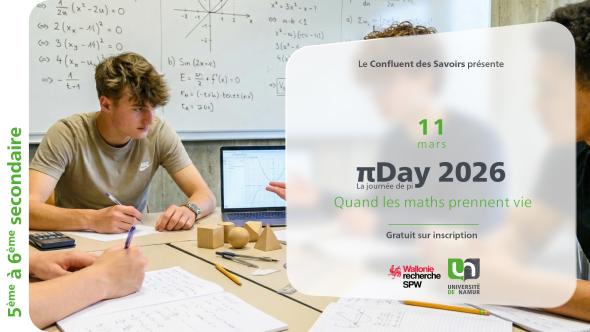
Practical information:
- When: Wednesday, March 11, 2026, from 8:30 a.m. to 12 p.m.
- Cost: Free
- Language: French
- Audience: 5th and 6th year secondary school students
- Meeting place: University of Namur (The exact address will be provided at a later date)
Program:
This morning event will feature several highlights:
- A warm welcome for groups to get the day off to a good start.
- Introductory lecture session: Mini-lectures in plenary sessions will address a variety of compelling topics, setting the stage and sparking curiosity about current mathematical themes.
- Parallel and successive practical workshops: After a short break, students are invited to participate actively. They rotate between three different workshops, offered in parallel. These sessions encourage experimentation and hands-on learning in small groups on specific topics.
Offer your students a free and enriching morning to (re)discover the joy of mathematics!
This activity is organized with the support of Wallonia Research.
Spring of Science 2026
Mark your calendars, Spring Science Festival is coming back to Namur from March 23 to 29, 2026!
Science, discoveries, and lots of activities for young and old alike!
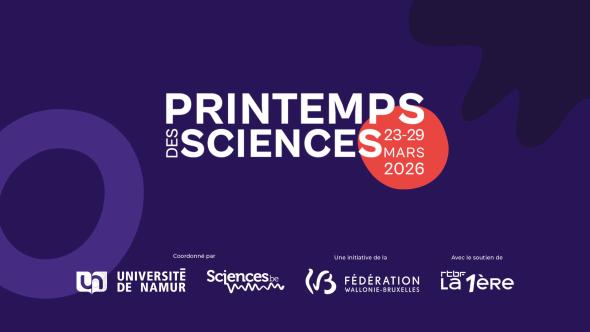
The Spring of Science is a major scientific and technological (STEM) event in Wallonia and Brussels. Initiated by the Wallonia-Brussels Federation, the event is coordinated by the Sciences.be network and organized by French-speaking universities and colleges. It takes place every year at the beginning of spring and is open to everyone, young and old alike.
Throughout the week, numerous free activities are offered to students during the week and to anyone who is curious.
Through this week of scientific and technological discovery, the Printemps des Sciences inspires or confirms scientific vocations, helps teachers improve and enrich science education, gives students a more realistic perception of what science is today, improves the general perception of science and technology, contributes to reintegrating science into the heart of general culture, and improves the scientific culture of citizens.
About this year's theme
"The awakening mind: 25 years of scientific culture"
Scientific culture helps us see the world differently: it teaches us to ask questions. Thanks to it, we discover hidden or surprising things that make everyday life more interesting. Scientific culture transforms what seems mundane into something extraordinary. It allows us to better understand our environment, to question ourselves, and to marvel at its beauty and complexity.
My Thesis in 180 Seconds · UNamur Final 2026
The My Thesis in 180 Seconds competition returns to the University of Namur for a new edition focused on a passion for research and sharing. During this evening event, UNamur doctoral students will have three minutes to present their thesis topic to a wide audience in a clear, dynamic, and accessible way.

MT180 is much more than a competition: it is a real exercise in popularization that highlights the creativity, commitment, and ingenuity of young researchers. With humor, simplicity, or emotion, each participant recounts their research, its challenges, and their discoveries, in order to reveal science in a different light.
Are you curious to see how sometimes highly specialized theses can become captivating stories in just a few minutes? Would you like to encourage the Namur candidates who will be taking to the stage?
Save the date for Friday, March 27, 2026, and come support them!
Practical information (schedule, location, registration details) will be announced shortly. Stay tuned: the event promises to be an inspiring evening that is accessible to all.
Subscribe to the Newsletter
With the CDS newsletter, you will receive the latest CDS news, a calendar of upcoming activities, and exclusive popularized content.
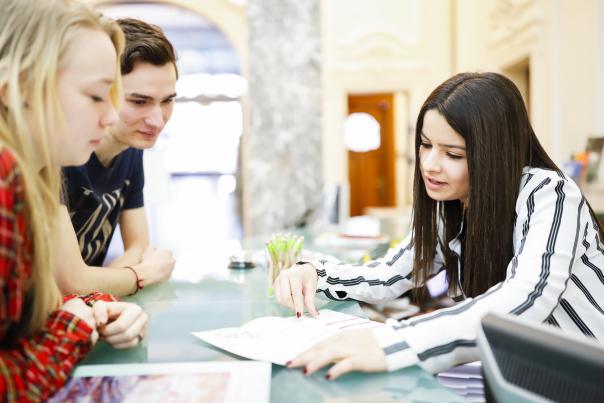
With the support of
